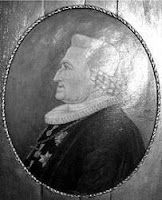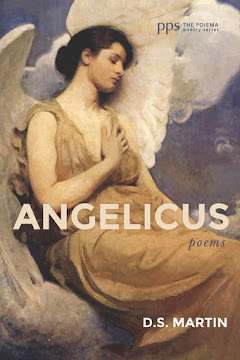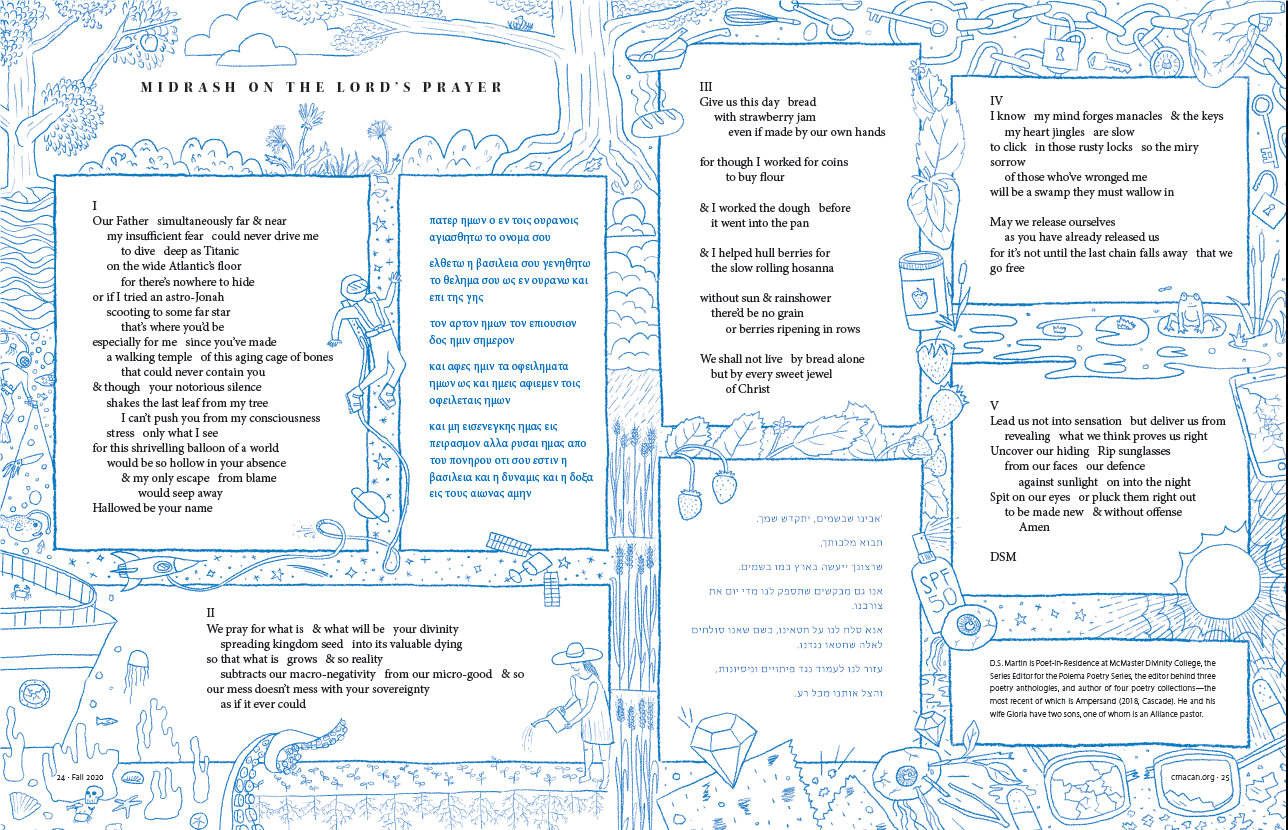Ben Jonson (1572—1637) is a British playwright and poet who spent time in prison on several occasions, both for his actions and for what he had written. In 1597 he was imprisoned for alleged seditious content in the unfinished satire The Isle of Dogs which Jonson had been hired to complete — and in 1605 for the collaboration Eastward Ho! which included a joke at the king’s expense.
Early on he found popularity with such satirical plays as Every Man in His Humour (1598), and Bartholomew Fair (1614). He later became popular in the court of James I, becoming unofficial Poet Laureate in 1616; for several years after this he focused on writing masques for presentation at court.
His early poetry, like his plays, often create witty portraits exposing human follies and vices. To me, his most-engaging works for today’s readers are his rich devotional poems which express the depth of his personal faith.
Jonson admired, and was admired by, such contemporaries as John Donne, and William Shakespeare; he was also influential on the generation of younger poets that followed, including Robert Herrick, and Richard Lovelace. A large crowd of mourners attended his funeral; his body is buried at Westminster Abbey.
To Heaven
Good and great God, can I not think of thee
But it must straight my melancholy be?
Is it interpreted in me disease
That, laden with my sins, I seek for ease?
Oh be thou witness, that the reins dost know
And hearts of all, if I be sad for show,
And judge me after; if I dare pretend
To ought but grace or aim at other end.
As thou art all, so be thou all to me,
First, midst, and last, converted one, and three;
My faith, my hope, my love; and in this state
My judge, my witness, and my advocate.
Where have I been this while exiled from thee?
And whither rapt, now thou but stoop'st to me?
Dwell, dwell here still. O, being everywhere,
How can I doubt to find thee ever here?
I know my state, both full of shame and scorn,
Conceived in sin, and unto labour borne,
Standing with fear, and must with horror fall,
And destined unto judgment, after all.
I feel my griefs too, and there scarce is ground
Upon my flesh to inflict another wound.
Yet dare I not complain, or wish for death
With holy Paul, lest it be thought the breath
Of discontent; or that these prayers be
For weariness of life, not love of thee.
*This is the second Kingdom Poets post about Ben Jonson: first post.
Entry written by D.S. Martin. He is the author of five poetry collections including Angelicus (2021, Cascade) ― a book of poems written from the point-of-view of angels. His books are available through Wipf & Stock.
Monday, June 27, 2022
Monday, June 20, 2022
Johan Nordahl Brun
Johan Nordahl Brun (1745—1816) is a poet, dramatist, and pastor. He was a Norwegian nationalist prior to Norway gaining independence from Denmark. In 1771 he wrote the song “For Norway, Birthplace of Heroes” which was banned by Danish authorities, and was considered Norway’s first unofficial national anthem. He also wrote two successful dramas, but his primary interest was to serve in the church.
As a theologian he opposed the narrow rationalism of the enlightenment. In 1804 he became bishop of Bergen. The portrait accompanying this post hangs in Bergen Cathedral.
In Heaven is Joy and Gladness
In heaven is joy and gladness,
But while I sojourn here,
So often, bowed in sadness,
I shed the bitter tear.
Here ills, always prevailing,
Distress the Saviour’s bride;
Here mirth is lost in wailing;
In heaven but joys abide.
I do not strive for pleasures
That fools pursue on earth,
I sow in tears for treasures
That have more lasting worth.
If, when my journey ends,
The sheaves I gather in,
The bliss the fool pretends
I do not yearn to win.
For I shall see my Jesus,
He is my Hope and Stay;
The cross that me oppresses
He then shall take away.
Then nothing more shall grieve me,
And no adversity
Shall of my joy bereave me;
Soon I shall Jesus see.
Entry written by D.S. Martin. He is the author of five poetry collections including Angelicus (2021, Cascade) ― a book of poems written from the point-of-view of angels. His books are available through Wipf & Stock.
As a theologian he opposed the narrow rationalism of the enlightenment. In 1804 he became bishop of Bergen. The portrait accompanying this post hangs in Bergen Cathedral.
In Heaven is Joy and Gladness
In heaven is joy and gladness,
But while I sojourn here,
So often, bowed in sadness,
I shed the bitter tear.
Here ills, always prevailing,
Distress the Saviour’s bride;
Here mirth is lost in wailing;
In heaven but joys abide.
I do not strive for pleasures
That fools pursue on earth,
I sow in tears for treasures
That have more lasting worth.
If, when my journey ends,
The sheaves I gather in,
The bliss the fool pretends
I do not yearn to win.
For I shall see my Jesus,
He is my Hope and Stay;
The cross that me oppresses
He then shall take away.
Then nothing more shall grieve me,
And no adversity
Shall of my joy bereave me;
Soon I shall Jesus see.
Entry written by D.S. Martin. He is the author of five poetry collections including Angelicus (2021, Cascade) ― a book of poems written from the point-of-view of angels. His books are available through Wipf & Stock.
Monday, June 13, 2022
Li Hao
Li Hao is a Beijing poet born in 1984. He is the winner of the Yulong Poetry Prize (2008) and the Beijing University Weiming Lake Poetry Prize (2007). Eleanor Goodman wrote in Words Without Borders, “He must toe a line as a younger poet living in Beijing and working for an official literary publication, careful to keep his verse free of material that might be considered proselytizing. Nevertheless, his first [officially] published collection, The Tempest, was banned [in China] and pulled from shelves not long after its publication.”
His poetry, besides having been translated into English, has been translated in Polish and various Asian languages. He is the author of two collections Returning Home, and The Tempest, as well as a mixed collection of poetry and essays, You and I. He also self-published an earlier poetry book in 2007, The Ladder of Deconstruction.
The following poem, translated by Eleanor Goodman, first appeared in Unfamiliar Riverbank: Contemporary Chinese Verse. It was described as “A poem about suffering and the Divine”.
I Want to Walk Toward the Altar of the Lord
The clamor of the dead on the wall
spin in the lobes of my lungs
the vault of heaven’s many
gears: corpulent
Leviathan of my soul,
covered in knifepoints, making the heavens
rain down iron nails. Eternal light
strikes upon the earth’s altars.
Lord, I am foolish,
I am suffering, and my body,
like a spoon, here on this earth, sweetly scoops out
my brain.
Entry written by D.S. Martin. He is the author of five poetry collections including Angelicus (2021, Cascade) ― a book of poems written from the point-of-view of angels. His books are available through Wipf & Stock.
His poetry, besides having been translated into English, has been translated in Polish and various Asian languages. He is the author of two collections Returning Home, and The Tempest, as well as a mixed collection of poetry and essays, You and I. He also self-published an earlier poetry book in 2007, The Ladder of Deconstruction.
The following poem, translated by Eleanor Goodman, first appeared in Unfamiliar Riverbank: Contemporary Chinese Verse. It was described as “A poem about suffering and the Divine”.
I Want to Walk Toward the Altar of the Lord
The clamor of the dead on the wall
spin in the lobes of my lungs
the vault of heaven’s many
gears: corpulent
Leviathan of my soul,
covered in knifepoints, making the heavens
rain down iron nails. Eternal light
strikes upon the earth’s altars.
Lord, I am foolish,
I am suffering, and my body,
like a spoon, here on this earth, sweetly scoops out
my brain.
Entry written by D.S. Martin. He is the author of five poetry collections including Angelicus (2021, Cascade) ― a book of poems written from the point-of-view of angels. His books are available through Wipf & Stock.
Monday, June 6, 2022
Emily Dickinson*
Emily Dickinson (1830—1886) is one of America’s best-loved poets. She was never one for simple explanations, but always a questioner — observing nature and working out her understanding of scripture in the light of all she saw and heard.
She made little effort to have her poems published, or even to be read beyond those she corresponded with. Her idiosyncratic rhythms, half-rhymes, punctuation, and capitalization — as well as how tightly her poems are edited down to their barest essence — often make them difficult for readers to quickly inhabit. Perhaps it is their uniqueness, though, that has enabled her work to reach beyond the more conventional verse of her day.
She also seems to have had no concern for how others may have viewed her — including as to whether she was a Christian or not. Although often outspoken in her questionings, she was never afraid to be seen as taking them directly to the one she calls “Our Lord.”
Savior! I’ve no one else to tell
Savior! I’ve no one else to tell —
And so I trouble thee.
I am the one forgot thee so —
Dost thou remember me?
Nor, for myself, I came so far —
That were the little load —
I brought thee the imperial Heart
I had not strength to hold —
The Heart I carried in my own —
Till mine too heavy grew —
Yet — strangest — heavier since it went —
Is it too large for you?
The Test of Love — is Death
The Test of Love — is Death —
Our Lord — "so loved" — it saith —
What Largest Lover — hath
Another — doth —
If smaller Patience — be —
Through less Infinity —
If Bravo, sometimes swerve —
Through fainter Nerve —
Accept it's Most —
And overlook — the Dust —
Last — Least —
The Cross' — Request —
*This is the third Kingdom Poets post about Emily Dickinson: first post, second post.
Entry written by D.S. Martin. He is the author of five poetry collections including Angelicus (2021, Cascade) ― a book of poems written from the point-of-view of angels. His books are available through Wipf & Stock.
She made little effort to have her poems published, or even to be read beyond those she corresponded with. Her idiosyncratic rhythms, half-rhymes, punctuation, and capitalization — as well as how tightly her poems are edited down to their barest essence — often make them difficult for readers to quickly inhabit. Perhaps it is their uniqueness, though, that has enabled her work to reach beyond the more conventional verse of her day.
She also seems to have had no concern for how others may have viewed her — including as to whether she was a Christian or not. Although often outspoken in her questionings, she was never afraid to be seen as taking them directly to the one she calls “Our Lord.”
Savior! I’ve no one else to tell
Savior! I’ve no one else to tell —
And so I trouble thee.
I am the one forgot thee so —
Dost thou remember me?
Nor, for myself, I came so far —
That were the little load —
I brought thee the imperial Heart
I had not strength to hold —
The Heart I carried in my own —
Till mine too heavy grew —
Yet — strangest — heavier since it went —
Is it too large for you?
The Test of Love — is Death
The Test of Love — is Death —
Our Lord — "so loved" — it saith —
What Largest Lover — hath
Another — doth —
If smaller Patience — be —
Through less Infinity —
If Bravo, sometimes swerve —
Through fainter Nerve —
Accept it's Most —
And overlook — the Dust —
Last — Least —
The Cross' — Request —
*This is the third Kingdom Poets post about Emily Dickinson: first post, second post.
Entry written by D.S. Martin. He is the author of five poetry collections including Angelicus (2021, Cascade) ― a book of poems written from the point-of-view of angels. His books are available through Wipf & Stock.
Subscribe to:
Posts (Atom)






















